Numbers, Facts and Trends Shaping Your World
Read our research on:
Full Topic List

Regions & Countries
- Publications
- Our Methods
- Short Reads
- Tools & Resources
Read Our Research On:
Diversity, Equity and Inclusion in the Workplace
A majority of u.s. workers say focusing on dei at work is a good thing, but relatively small shares place great importance on diversity in their own workplace, table of contents.
- The value of DEI efforts at work
- The importance of a diverse workforce
- DEI measures and their impact
- How gender, race and ethnicity impact success in the workplace
- Acknowledgments
- The American Trends Panel survey methodology

Pew Research Center conducted this study to better understand how adults in the United States think about diversity, equity and inclusion efforts in the workplace. This analysis is based on survey responses from 4,744 U.S. adults who are working part time or full time, are not self-employed, have only one job or have multiple jobs but consider one their primary job, and whose company or organization has 10 or more people. The data was collected as part of a larger survey of workers conducted Feb. 6-12, 2023. Everyone who took part is a member of Pew Research Center’s American Trends Panel (ATP), an online survey panel that is recruited through national, random sampling of residential addresses. This way nearly all U.S. adults have a chance of selection. The survey is weighted to be representative of the U.S. adult population by gender, race, ethnicity, partisan affiliation, education and other categories. Read more about the ATP’s methodology .
Read more about the questions used for this report and the report’s methodology .
References to workers or employed adults include those who are employed part time or full time, are not self-employed, have only one job or have multiple jobs but consider one their primary job, and whose company or organization has 10 or more people.
References to White, Black and Asian adults include those who are not Hispanic and identify as only one race. Hispanics are of any race.
References to college graduates or people with a college degree comprise those with a bachelor’s degree or more. “Some college” includes those with an associate degree and those who attended college but did not obtain a degree.
References to disabled workers include those who say a disability or handicap keeps them from fully participating in work, school, housework or other activities.
All references to party affiliation include those who lean toward that party. Republicans include those who identify as Republicans and those who say they lean toward the Republican Party. Democrats include those who identify as Democrats and those who say they lean toward the Democratic Party.
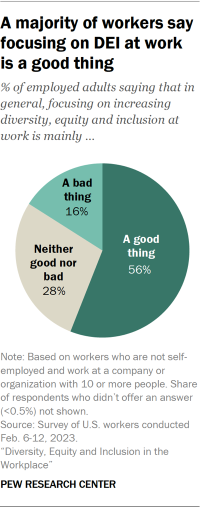
Workplace diversity, equity and inclusion efforts, or DEI, are increasingly becoming part of national political debates . For a majority of employed U.S. adults (56%), focusing on increasing DEI at work is a good thing, according to a new Pew Research Center survey. But opinions about DEI vary considerably along demographic and political lines.
Most workers have some experience with DEI measures at their workplace. About six-in-ten (61%) say their company or organization has policies that ensure fairness in hiring, pay or promotions, and 52% say they have trainings or meetings on DEI at work. Smaller shares say their workplace has a staff member who promotes DEI (33%), that their workplace offers salary transparency (30%), and that it has affinity groups or employee resource groups based on a shared identity (26%). Majorities of those who have access to these measures say each has had a positive impact where they work.
Related : How Americans View Their Jobs
This nationally representative survey of 5,902 U.S. workers, including 4,744 who are not self-employed, was conducted Feb. 6-12, 2023, using the Center’s American Trends Panel . 1 The survey comes at a time when DEI efforts are facing some backlash and many major companies are laying off their DEI professionals .
Some key findings from the survey:
- Relatively small shares of workers place a lot of importance on diversity at their workplace. About three-in-ten say it is extremely or very important to them to work somewhere with a mix of employees of different races and ethnicities (32%) or ages (28%). Roughly a quarter say the same about having a workplace with about an equal mix of men and women (26%) and 18% say this about a mix of employees of different sexual orientations.
- More than half of workers (54%) say their company or organization pays about the right amount of attention to increasing DEI. Smaller shares say their company or organization pays too much (14%) or too little attention (15%), and 17% say they’re not sure. Black workers are more likely than those in other racial and ethnic groups to say their employer pays too little attention to increasing DEI. They’re also among the most likely to say focusing on DEI at work is a good thing (78% of Black workers say this), while White workers are the least likely to express this view (47%).
- Women are more likely than men to value DEI at work. About six-in-ten women (61%) say focusing on increasing DEI at work is a good thing, compared with half of men. And larger shares of women than men say it’s extremely or very important to them to work at a place that is diverse when it comes to gender, race and ethnicity, age, and sexual orientation.
- There are wide partisan differences in views of workplace DEI. Most Democratic and Democratic-leaning workers (78%) say focusing on DEI at work is a good thing, compared with 30% of Republicans and Republican leaners. Democrats are also far more likely than Republicans to value different aspects of diversity. And by wide margins, higher shares of Democrats than Republicans say the policies and resources related to DEI available at their workplace have had a positive impact.
- Half of workers say it’s extremely or very important to them to work somewhere that is accessible for people with physical disabilities. About three-in-ten workers (29%) say this is somewhat important to them, and 21% say it’s not too or not at all important. A majority of workers (76% among those who do not work fully remotely) say their workplace is at least somewhat accessible for people with physical disabilities.
- Many say being a man or being White is an advantage where they work. The survey asked respondents whether a person’s gender, race or ethnicity makes it easier or harder to be successful where they work. Shares ranging from 45% to 57% say these traits make it neither easier nor harder. But far more say being a man and being White makes it easier than say it makes it harder for someone to be successful. Conversely, by double-digit margins, more say being a woman, being Black or being Hispanic makes it harder than say it makes it easier to be successful where they work.
A majority of workers (56%) say focusing on increasing diversity, equity and inclusion at work is mainly a good thing; 28% say it is neither good nor bad, and 16% say it is a bad thing. Views on this vary along key demographic and partisan lines.

Half or more of both men and women say focusing on increasing DEI at work is a good thing, but women are more likely than men to offer this view (61% vs. 50%). In turn, men are more than twice as likely as women to say it is a bad thing (23% vs. 9%).
About two-thirds or more of Black (78%), Asian (72%) and Hispanic (65%) workers say that focusing on DEI at work is a good thing. Among White workers, however, fewer than half (47%) say it’s a good thing; in fact, 21% say it’s a bad thing. But there are wide partisan, gender and age gaps among White workers, with majorities of White Democrats, women and those under age 30 saying focusing on DEI at work is a good thing.
Workers under 30 are the most likely age group to say focusing on DEI at work is a good thing. About two-thirds (68%) of workers ages 18 to 29 say this, compared with 56% of workers 30 to 49, 46% of those 50 to 64, and 52% of those 65 and older.
Views also differ by educational attainment, with 68% of workers with a postgraduate degree saying focusing on DEI at work is a good thing, compared with 59% of those with a bachelor’s degree only and 50% of those with some college or less education.
Democratic and Democratic-leaning workers are much more likely to say focusing on DEI at work is a good thing (78%) than to say it is a bad thing (4%) or that it is neither good nor bad (18%). Views among Republican and Republican-leaning workers are more mixed: Some 30% say focusing on DEI at work is a good thing, while the same share (30%) say it’s a bad thing, and 39% say it’s neither good nor bad.
A majority of workers say their employer pays the right amount of attention to DEI
When it comes to the focus of their own employer, 54% of workers say their company or organization pays about the right amount of attention to increasing diversity, equity and inclusion. The remainder are divided between saying their employer pays too much (14%) or too little attention (15%), or that they’re not sure (17%).
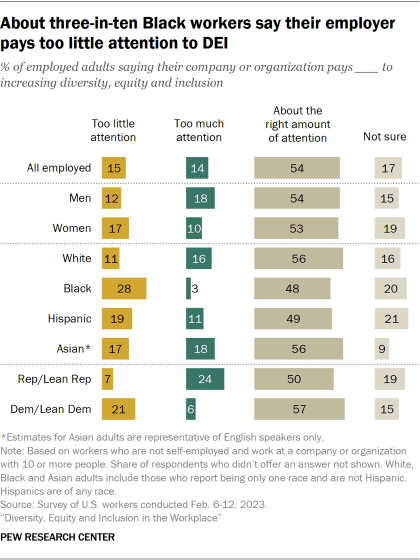
Women are more likely than men to say their employer pays too little attention to increasing DEI (17% vs. 12%). In turn, men are more likely than women to say too much attention is paid to this where they work (18% vs. 10%).
Black workers (28%) are the most likely to say their company or organization pays too little attention to increasing DEI, compared with smaller shares of White (11%), Hispanic (19%) and Asian (17%) workers who say the same.
Views on this question also differ by party. While half or more of both Republican and Democratic workers say their company or organization pays the right amount of attention to DEI, Democrats are more likely than Republicans to say their employer pays too little attention to it (21% vs. 7%). In turn, Republicans are more likely than Democrats to say their employer pays too much attention to DEI (24% vs. 6%).
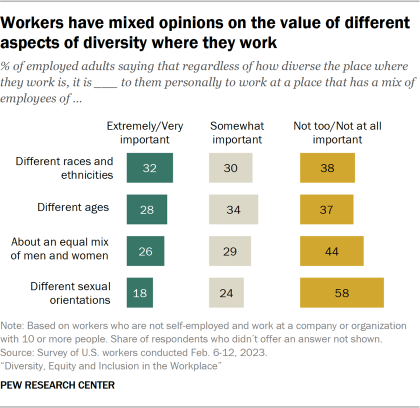
While a majority of workers say focusing on increasing diversity, equity and inclusion at work is a good thing, relatively small shares place great importance on working at a place that is diverse when it comes to gender, race and ethnicity, age, and sexual orientation. About three-in-ten workers say it’s extremely or very important to them to work somewhere with a mix of employees of different races and ethnicities (32%) and ages (28%), while 26% say the same about having about an equal mix of men and women. And 18% say this about having a mix of employees of different sexual orientations at their workplace.
Women are more likely than men to say it’s extremely or very important to them to work at a place that is diverse across all measures asked about in the survey. For example, there are 11 percentage point differences in the shares of women compared with men saying it is extremely or very important to them to work somewhere that has a mix of employees of different races and ethnicities (37% vs. 26%) and about an equal mix of men and women (31% vs. 20%).
Black workers are among the most likely to value racial, ethnic and age diversity in the workplace. Some 53% of Black workers say it is extremely or very important to them to work somewhere with a mix of employees of different races and ethnicities, compared with 39% of Hispanic workers and 25% of White workers who say the same; 43% of Asian workers say this is important to them. (There is no statistically significant difference between the share of Asian workers and the shares of Black and Hispanic workers who hold this view.) And while 42% of Black workers highly value working somewhere with a mix of employees of different ages, smaller shares of Hispanic (33%), Asian (30%) and White (24%) workers say the same.
When it comes to diversity of sexual orientation, 28% of Black workers and 22% of Hispanic workers say it is extremely or very important to them to work somewhere that is diverse in this way; 15% each among White and Asian workers say the same.
Workers under age 50 are more likely than those 50 and older to say racial and ethnic diversity in their workplace is extremely or very important to them (35% vs. 26%). Workers younger than 50 are also more likely to say having about an equal mix of men and women is important to them, with workers ages 18 t0 29 the most likely to say this (34% vs. 26% of workers 30 to 49, and 20% each among those 50 to 64 and 65 and older).
There are also differences by educational attainment, with larger shares of workers with a postgraduate degree than those with less education saying it’s extremely or very important to them that their workplace is diverse across all measures asked about in the survey. For example, 44% of workers with a postgraduate degree say having a mix of employees of different races and ethnicities is extremely or very important to them, compared with 34% of those with a bachelor’s degree only and 27% of those with some college or less.
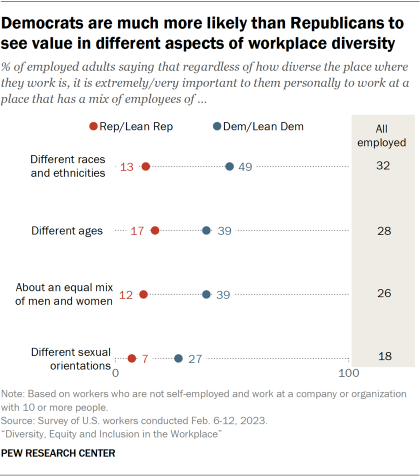
Democratic workers are much more likely than Republican workers to say working somewhere that is diverse when it comes to gender, race and ethnicity, age, and sexual orientation is extremely or very important to them. In fact, about half of Democrats (49%) place great importance on having a mix of employees of different races and ethnicities where they work, compared with 13% of Republicans. And there are differences of at least 20 points between the shares of Democrats and Republicans saying it’s extremely or very important to them to work somewhere that has about an equal mix of men and women (39% of Democrats say this vs. 12% of Republicans) and a mix of employees of different ages (39% vs. 17%) and sexual orientations (27% vs. 7%).
Overall, a majority of workers say their workplace has a mix of employees of different ages (58% say this describes their current workplace extremely or very well). Smaller shares say their workplace has about an equal mix of men and women (38%) and a mix of employees of different races and ethnicities (46%) and sexual orientations (28%). These assessments do not vary much across demographic groups.
Half of workers place great importance on working at a place that is accessible for people with physical disabilities
Half of workers say it is extremely or very important to them to work somewhere that is accessible for people with physical disabilities; 29% say it is somewhat important and 21% say it is not too or not at all important to them.
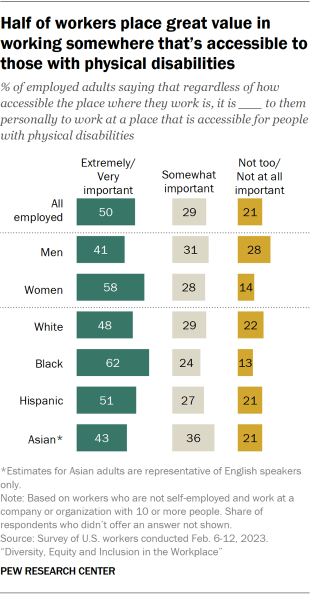
Highly valuing an accessible workplace varies by gender, race and ethnicity, and party, but there is no significant difference in responses between those who do and don’t report having a disability.
About six-in-ten women (58%) say it is extremely or very important to them that their workplace is accessible, compared with 41% of men.
Black workers are more likely than workers of other racial and ethnic groups to place great importance on their workplace being accessible: 62% of Black workers say this is extremely or very important, compared with 51% of Hispanic, 48% of White and 43% of Asian workers.
A majority of Democrats (59%) say it is extremely or very important to them to work somewhere that is accessible for people with physical disabilities; 40% of Republican say the same. Some 27% of Republicans say this is not too or not at all important to them, compared with 15% of Democrats.
There is no statistically significant difference in the shares of workers who have a disability and those who do not saying it is extremely or very important to them to work somewhere that is accessible for people with physical disabilities. But workers who do not have a disability are more likely than those who do to say this is not too or not at all important to them (21% vs. 15%).
Among those who don’t work fully remotely, about three-quarters of workers (76%) say their workplace is at least somewhat accessible for people with physical disabilities, with 51% saying it is extremely or very accessible. Some 17% say their workplace is not too or not at all accessible, and 8% are not sure.
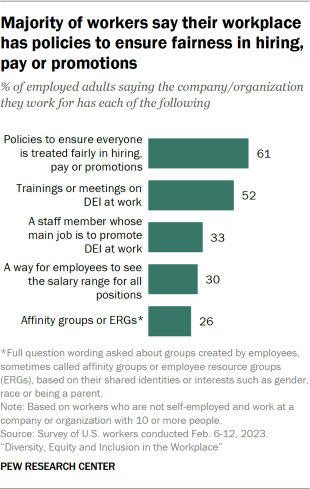
When asked whether the company or organization they work for has a series of measures that are typically associated with diversity, equity and inclusion efforts, a majority of workers say their employer has policies that ensure everyone is treated fairly in hiring, pay or promotions (61%), and 52% say there are trainings or meetings on DEI where they work.
Smaller shares say their workplace has a staff member whose main job is to promote DEI at work (33%), a way for employees to see the salary range for all positions (30%), and groups created by employees sometimes known as affinity groups or employee resource groups (ERGs) based on shared identities such as gender, race or being a parent (26%).
Responses do not vary much by most demographic characteristics. However, workers with at least a bachelor’s degree are consistently more likely than those with less education to say each of these five measures is available where they work.
Workers tend to see positive impact from policies and resources associated with DEI where they work
Among those whose workplace offers each policy or resource, a majority of workers say each measure has had a somewhat or very positive impact where they work. About a third or fewer workers say each resource has had neither a positive nor negative impact, and about one-in-ten or fewer say each of these has had a somewhat or very negative impact.
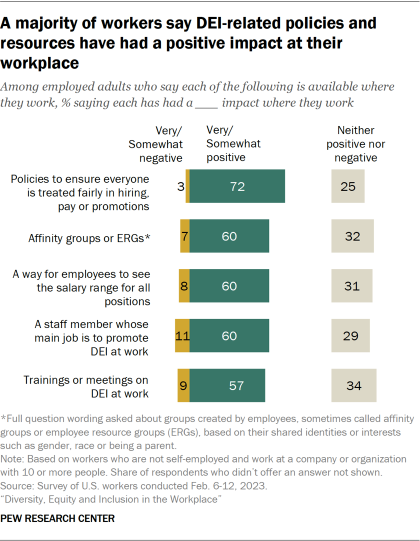
Democrats and Republicans are about equally likely to say their workplace has these measures in place, but Democrats are more likely than Republicans to say the impact of each has been positive by margins ranging from 10 to 32 points (among those who say their workplace has these measures). For example, 66% of Democrats who say their workplace has a way for employees to see the salary range for all positions say this has had a somewhat or very positive impact, compared with 56% of Republicans who say this. And while about three-quarters of Democrats (74%) say having a staff member whose main job is to promote DEI at work has had a positive impact, fewer than half of Republicans (42%) say the same.
Women are more likely than men to say each of these policies and resources has had a very or somewhat positive impact where they work. This is mainly driven by gender differences among Republicans: There are double-digit differences in the shares of Republican women and Republican men who say many of these resources have had a positive impact. For example, 58% of Republican women say having a staff member whose main job is to promote DEI at work has had at least a somewhat positive impact where they work, compared with 31% of Republican men who hold this view. The same share of Republican women (58%) say having affinity groups or ERGs has had a positive impact, compared with 38% of Republican men who say the same.
Among Democrats, majorities of both men and women offer positive assessments of these resources in their workplace, but Democratic women are more likely than Democratic men to say having trainings or meetings on DEI at work have had a positive impact (72% vs. 65%).
While there are differences by race, ethnicity and age on overall attitudes about DEI in the workplace, there are no consistent differences along these dimensions in how workers with access to these policies and resources at their workplace assess their impact.
About half of workers who have participated in DEI trainings in the last year say they’ve been helpful
Out of all workers, about four-in-ten (38%) have participated in a DEI training in the last year. A similar share (40%) did not participate or say their workplace does not offer these trainings, and 21% are not sure if their employer offers these trainings.
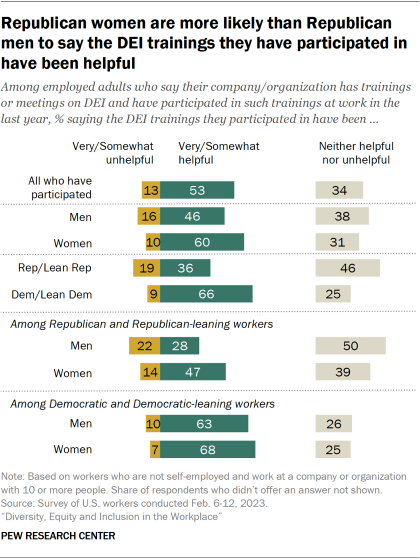
Looking only at those whose company or organization has trainings or meetings on DEI, about three-quarters (73%) say they have participated in such trainings in the past year. And assessments of these trainings tend to be positive, with 53% of workers who’ve participated saying they were very or somewhat helpful. About a third (34%) give a more neutral assessment, saying the trainings were neither helpful nor unhelpful, and 13% say they were very or somewhat unhelpful.
While men and women are about equally likely to have participated in trainings on DEI in the past year, women are more likely than men to say the trainings have been at least somewhat helpful (60% vs. 46%).
Republicans and Democrats are also equally likely to say they’ve participated in these trainings in the past year, but Democrats are far more likely than Republicans to say the trainings have been helpful (66% vs. 36%). About one-in-five Republicans say they’ve been unhelpful (19%), compared with 9% of Democrats.
While both Democratic men and women offer similar assessments of the DEI trainings they’ve participated in, there are gender differences among Republican workers. Republican women are more likely than Republican men to say the trainings they’ve participated in have been helpful (47% vs. 28%). Conversely, 22% of Republican men, compared with 14% of Republican women, say the trainings have been unhelpful.
Few workers are members of affinity groups or ERGs at work
While 26% of workers say there are affinity groups or employee resource groups (ERGs) where they work, members of these groups account for a very small share of workers overall. Just 6% of workers say they are members of an affinity group or ERG, with 58% of workers saying these groups are either not available at their workplace or that they aren’t a member. Another 37% say they are not sure if their workplace offers these groups.
Among workers who say there are affinity groups or ERGs at their workplace, 22% say they are personally a member. Women are more likely than men to be members of these groups (28% vs. 16%). And 28% of non-White workers say they are a member of an affinity group or ERG, compared with 18% of White workers. 2
When asked about the impact a person’s gender, race or ethnicity has on their ability to succeed at work, workers tend to say these characteristics neither make it easier nor harder to be successful at their workplace.
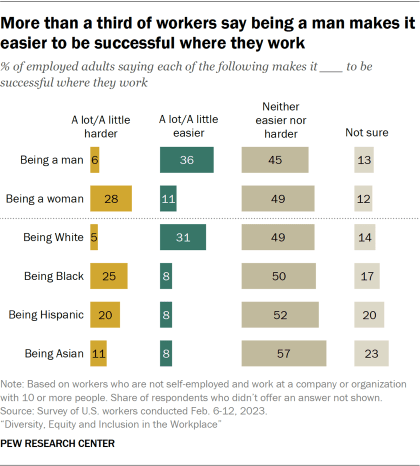
Still, when it comes to gender, workers are more likely to say being a man makes it easier to be successful where they work than to say it makes it harder (36% vs. 6%). In contrast, a larger share says being a woman makes it harder to be successful than say it makes it easier (28% vs. 11%).
Men and women have different views on the impact gender has on a person’s ability to succeed where they work. Some 44% of women say being a man makes it at least a little easier to be successful, including 24% who say it makes it a lot easier. This compares with 29% of men who say being a man makes it at least a little easier to be successful.
Similarly, 34% of women say being a woman makes it harder to be successful where they work, compared with 21% of men.
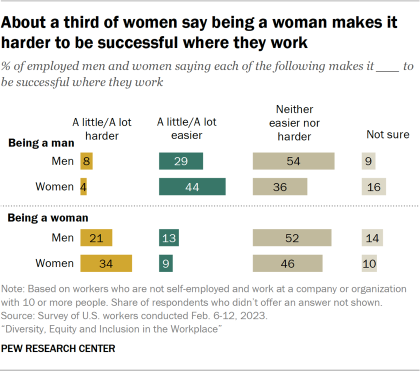
Women under age 50 are especially likely – more so than women ages 50 and older or men in either age group – to say being a man makes it easier to be successful where they work and that being a woman makes it harder. For example, 38% of women ages 18 to 49 say being a woman makes it harder to be successful where they work. This compares with 29% of women 50 and older, 25% of men younger than 50, and an even smaller share of men 50 and older (13%).
When it comes to views about how race or ethnicity affects people’s ability to succeed at work, 51% of Black workers say being Black makes it harder to be successful where they work. This is significantly higher than the shares of Asian (41%), Hispanic (23%) and White (18%) workers who say the same about the impact of being Black.
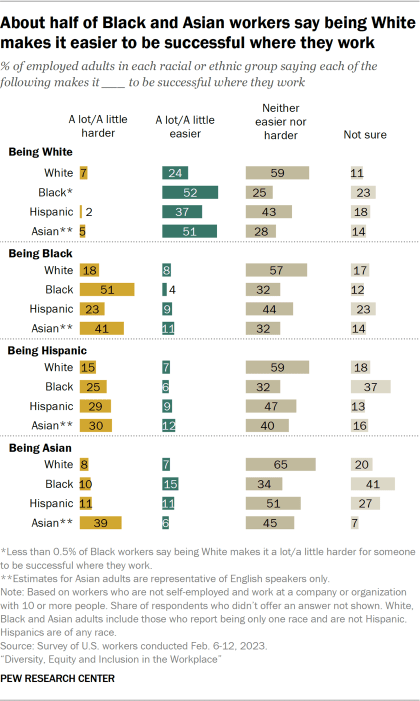
Similarly, about four-in-ten Asian workers (39%) say being Asian makes it harder to be successful in their workplace, a higher share than workers of other racial and ethnic groups who say the same about being Asian.
Hispanic, Black and Asian workers are about equally likely to say being Hispanic makes it harder to be successful where they work. A smaller share of White workers say the same about being Hispanic.
When asked about the impact of being White in their workplace, workers across racial and ethnic groups are more likely to say it makes it easier than to say it makes it harder to be successful. This is especially the case among Black and Asian workers. About half of Black (52%) and Asian (51%) workers say being White makes it easier to be successful where they work, compared with 37% of Hispanic and 24% of White workers who say the same about being White.
Previously released findings from this survey found that Black workers are more likely than White, Hispanic and Asian workers to report that they have experienced discrimination or have been treated unfairly by an employer in hiring, pay or promotions because of their race or ethnicity at some point in their careers (though not necessarily where they currently work). Women are also more likely than men to say they’ve experienced such discrimination because of their gender.
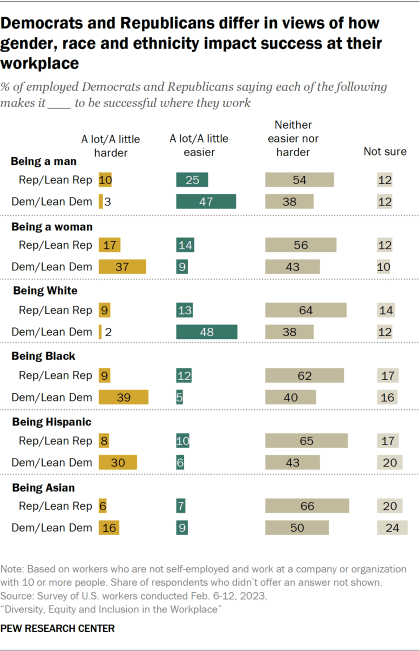
There are large partisan gaps in views of whether gender, race or ethnicity make it easier or harder to be successful at work. Some 47% of Democratic workers say being a man makes it at least somewhat easier to be successful at their workplace, compared with 25% of Republican workers. Democrats are also more likely than Republicans to say being a woman makes it harder to succeed (37% vs. 17%).
Democratic and Republican women are more likely than their male counterparts to say being a woman makes it harder – and being a man makes it easier – to be successful where they work. The differences between Republican women and Republican men are particularly striking. About a quarter of Republican women (26%) say being a woman makes it harder to be successful, compared with 10% of Republican men. And while 36% of Republican women say being a man makes it easier to be successful where they work, just 16% of Republican men say the same.
Democratic workers are more than three times as likely as Republican workers to say being White makes it easier to succeed where they work (48% vs. 13%), and they are also more likely than Republicans to say being Black, Hispanic or Asian makes it harder. About four-in-ten Democrats (39%) say being Black makes it harder for someone to succeed at their workplace, compared with just 9% of Republicans. Similarly, 30% of Democrats say being Hispanic makes it harder to succeed, compared with 8% of Republicans. And while smaller shares in both parties say being Asian makes it harder to succeed, Democrats are more likely than Republicans to say this (16% vs. 6%). These partisan differences remain when looking only at Democrats and Republicans who are White.
- For details, see the Methodology section of the report. The analysis in this report is based on U.S. workers who are employed full time or part time, who are not self-employed, and who have only one job or have multiple jobs but consider one their primary job (99% of workers who are not self-employed have one job or a primary job). Additionally, the analysis is restricted to workers at companies or organizations with at least 10 employees as certain federal requirements such as non-discrimination mandates apply to larger workplaces. ↩
- Non-White adults include Black, Hispanic, Asian and other races besides White, as well as people who identify as more than one race. The sample sizes among Black, Hispanic and Asian workers who have affinity groups or ERGs at work are too small to analyze separately. ↩

Sign up for our weekly newsletter
Fresh data delivery Saturday mornings
Sign up for The Briefing
Weekly updates on the world of news & information
- Asian Americans
- Black Americans
- Business & Workplace
- Discrimination & Prejudice
- Economics, Work & Gender
- Economy & Work
- Gender & Work
- Happiness & Life Satisfaction
- Hispanics/Latinos
- Partisanship & Issues
- Race & Ethnicity
- Racial Bias & Discrimination
- Sexual Misconduct & Harassment
- White Americans
Views of DEI have become slightly more negative among U.S. workers
A look at small businesses in the u.s., a look at black-owned businesses in the u.s., 2023 saw some of the biggest, hardest-fought labor disputes in recent decades, do you tip more or less often than the average american, most popular, report materials.
- American Trends Panel Wave 121
901 E St. NW, Suite 300 Washington, DC 20004 USA (+1) 202-419-4300 | Main (+1) 202-857-8562 | Fax (+1) 202-419-4372 | Media Inquiries
Research Topics
- Email Newsletters
ABOUT PEW RESEARCH CENTER Pew Research Center is a nonpartisan, nonadvocacy fact tank that informs the public about the issues, attitudes and trends shaping the world. It does not take policy positions. The Center conducts public opinion polling, demographic research, computational social science research and other data-driven research. Pew Research Center is a subsidiary of The Pew Charitable Trusts , its primary funder.
© 2024 Pew Research Center
Research Roundup: How Women Experience the Workplace Today
by Dagny Dukach

Summary .
In 2021, the gender gap in U.S. workforce participation hit an all-time low . But of course, substantial gender disparities persist in pay, leadership representation, access to resources, and many other key metrics. How can we make sense of all these different dimensions of gender equity in the workplace?
Partner Center

IMAGES
VIDEO